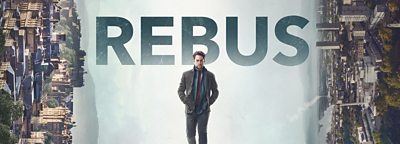Rebus launches on Friday 17 May. All episodes will be available on BBC iPlayer from 6am, with episode one airing on BBC Scotland on Friday 17 May at 10pm and on BBC One on Saturday 18 May at 9:25pm.
Based on the best-selling books by Ian Rankin, Rebus reimagines the iconic character John Rebus (Richard Rankin) as a younger Detective Sergeant, drawn into a violent criminal conflict that turns personal.
Shaken after a violent encounter with gangster Ger Cafferty, Edinburgh detective John Rebus finds himself at a psychological crossroads. At odds with a job increasingly driven by corporate technocrats, involved in a toxic affair he knows he needs to end, and all but supplanted in his daughter’s life by his ex-wife’s wealthy new husband, Rebus begins to wonder if he still has a role to play – either as a family man or a police officer. In a time of divisive politics and national discord, Rebus’ broke, ex-soldier brother Michael desperately crosses the line to provide for his family, and Rebus begins to wonder if the law still has meaning, or if everyone is reverting to an older set of rules? And if so, why shouldn’t Rebus do so too?
EJ
Interview with Ian Rankin (Author & Executive Producer)
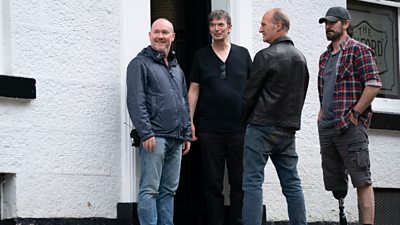
How does the new series differ from your novels?
In the new incarnation, there's a fascinating focus on Rebus and his brother. There have been characters and situations in the books where I felt that in retrospect I didn't do enough with them. Rebus’ brother was a really interesting character in the books, and eventually I just let him go, and he never returned. During our various conversations early on, Greg Burke zoned in on that almost blood brothers thing or that Jekyll & Hyde thing where you can have two brothers who are close to each other, who love each other, but potentially can destroy each other. I just thought that was a really interesting route that Greg chose for the series to follow. He takes us into the Jekyll & Hyde nature of Edinburgh.
Why is Gregory the perfect person to adapt your novels for the screen?
I've known Greg for years. I'm a huge fan of his work on stage and on screen. When he was persuaded to take this on - and he took a bit of persuading because he had a lot on his plate at the time – I was delighted. He comes from the same place as me. We grew up four miles apart, which is where Rebus comes from. We never knew each other back then, but his very first play was called Gagarin Way. Gagarin Way is a real street in a little village called Lumphinnans, which I used to go through every day on my way to school. Just as soon as I saw the phrase Gagarin Way, I thought, “Oh my god, this guy obviously comes from the same part of the world as me,” so I sought him out.
Did you discover that you had a lot in common?
Absolutely. We've got the same working-class roots, we've got the same sense of Fife being a very close-knit place, a very tribal place, a place that had a lot of pride, a lot of industry, a lot of coal mining - most of my family came from coal fields. But that industry went and a lot of the pride then dissipated and people felt neglected. So Rebus and his brother have all of that in their DNA, and I think a lot of that comes out in the series. His brother still lives in Fife, he's not done as well for himself as Rebus has. He lives in a fairly scuzzy part of Fife, but he is trying to make a better life for himself, scratching a living as best he can. And there's Rebus who, as a detective, is on a pretty good salary. We’ve put him in a street where he can actually walk out of his front door and see Edinburgh Castle, which is a bit of a cheat. That's not where he stays in the books! But in the TV version, if he looks to his left, he can see the castle. So we get lots of lovely establishing shots.
Are you pleased with Gregory’s adaptation?
Very. I think long term fans will get a shock because they're seeing young Rebus. Richard Rankin is not in his 70s or his 60s or his 50s, so they're getting the quite macho Rebus from the early books, but set in contemporary times. We get the strength of Rebus as a quite a gung-ho cop, but set against contemporary issues, contemporary politics and contemporary problems that people have. At its best, a crime novel is a political novel insofar as it deals with the reasons why crime happens. A lot of the time it’s to do with people being stuck in a rut. They see no way out that is legal, and their life crumbles around them. So they turn to drugs and drink and that leads them to some very dark places. I think Gregory was interested in tackling some of those issues, and it works really well.
What further themes does Gregory address in Rebus?
There is great richness and complexity in his writing. He is also fascinated by the male ego. He's really interested in what normative masculinity does to men, and how it can twist them, and how it can cause them to do terrible things. That's been a theme that I think runs through quite a lot of his work: this notion of very strong, macho men, and that macho-ness isn't always good for them - in fact, it's never good for them. You've got that in the relationship between Rebus and his brother. When we first meet them in episode one, they are having a punch-up in the living room. That says quite a lot about not only your relationship but also your background.
What do you think Richard adds to the title role?
Oh, he's terrific. I mean, you can't take your eyes off him. He's incredibly charismatic on screen. You're absolutely gripped by him. He's a lovely guy when you meet him but he completely inhabits the character. Rebus is attractive to women and attractive to men – you get all of that with Richard. Men are going to love watching him and women are going to love watching him. He just throws himself into it.
Why do you think the Rebus novels have struck such a chord all over the world?
The author is possibly the last person to know the answer to that question! I think Rebus is an engaging and complex character. He's charismatic, unlike his creator! But also we watch him age more or less in real time. So if you're a fan of the series, the Rebus you are reading about now is not the Rebus you were reading about 10 or 20 years ago. In the books he’s gone from being 40 years old, to being retired in poor health and getting on for 70. So it’s a very different world that he inhabits now. He’s no longer a serving police officer. He’s just a guy who wants to feel useful and wants to feel that he still has some skills as a detective, if only the world would allow him to use those skills. The world has changed around him and he has become a museum piece.
Why does the character of Rebus chime with people so much?
Rebus is dark, brooding and slightly dangerous and edgy. He’s someone people would like to meet for a short time. The books allow them to meet him for a short time, but I don’t think you’d want to hang out for too long. I mean, if he bumped into me, I’m sure we wouldn’t have much of a conversation before he got bored of me and wandered off. He’d be much more interested in the drink than he would be in the person who was talking to him. I think he also feels real to people, partly because he inhabits what is more or less a real city. He drinks in real bars, he worked in a real police station, he lives in a real street. You can actually trace his peregrinations around the city. Fans do come to the city looking for Rebus’s Edinburgh, and it’s there waiting for them.
How does Rebus develop over this series?
While being a big macho cop, he realises that doesn’t mean he can operate in the world as well as he could if he were less like that. So he’s surrounded by cops who are younger, more touchy feely, liberal and college educated. His way of doing things is different and doesn’t always work. It isn’t always the best way to go about it. So there’s a lot of lessons being learned by him during the course of the six episodes.
How would you sum up this drama?
It has really good storytelling and great acting. It’s also a very physical piece of work. A lot of crime stories on television these days are interested in forensics, or they’re interested in the crime scene or whatever. This is really about what the job of being a cop does to you. Does it coarsen you? Does it mean you live an uglier life because of the job you do? Being a cop makes you very wary of the people around you and of relationships. You’re always mistrusting people or thinking they’re out to do something to you or get the better of you or get something over on you. So it harks back in some ways to the kind of classic macho crime stories that a lot of us grew up with. But at the same time, it’s got all the modernity you could ask for.
Interview with Gregory Burke (Writer & Executive Producer)
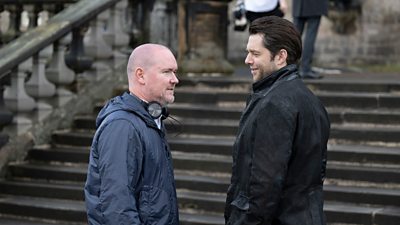
What drew you to Rebus?
The number one thing was Ian asking me. I’ve known Ian for quite a while now. He claims the first time we ever met was when he was making a documentary for German television about the Edinburgh Festival with Alan Cumming. You can’t make this stuff up! Ian says he came to the Traverse Theatre very late one night and interviewed me and John Tiffany on the stage, but I have no recollection of it. I guess that sums up the festival really! So he reckons that was about 20 years ago. We have a lot in common. Our hometown villages are very near each other in Fife, so he’d always said that if Rebus was going to be done again on TV, he would ask me if I could do it. I was delighted to take it on.
Did you feel a strong link with Rebus, then?
Definitely. Rebus is not just a Scottish character; he is actually a character who is a Fifer who lives and works in Edinburgh. My background is the same. He’s from a mining background, and my grandparents on one side were all from those mining towns and villages. So the background of the character felt really close to me. Rebus inhabits the same kind of psychological landscape and has had the same upbringing as me. This is a detective drama, but at the same time, I thought, “Rebus is a character that I can use to write about Scotland in the way I want to write about Scotland. He has similar type of upbringing and background to me”. So it felt like it would be daft not to do it. That’s what drew me in the most.
In what other ways did you feel connected to Rebus?
His kind of character is very recognisable to me. I am a little bit that way myself. There’s a Scottish word – “thrawn” – which means you make life as difficult as possible for yourself. Things could probably be a lot easier for you, but you have that kind of personality which is drawn to not taking the easiest road. That’s one of the things that Rebus does. The detective who goes against the grain is a trope of TV detectives. But at the same time, it is something that is quite recognisable to me, not just in terms of the institutional world of Scotland, but in Scotland generally. People have that kind of contrary nature where they can’t help but make their life more difficult than it should be. That was one of the things I liked in this character.
Would it also be fair to describe Rebus as a divided soul?
Yes. That schism, where people are two things at once, runs through the literature of Edinburgh. A lot of the great Edinburgh novels are about the divided self. Jekyll & Hyde is obviously the most famous one. The character of Rebus has a bit of that in him. He does have that kind of divided self, but also a divisive personality. So another thing that was really a big draw for me was getting to write something set in Edinburgh with that continuum of literature almost flowing through it.
Can you amplify the idea of Rebus’ duality?
As a policeman, it is his job to uphold the law. But he’s also a person who is willing to go beyond the law and to do things where the end justifies the means. I kept saying to people when we were making the drama, it’s about rules and laws. The laws are the things in our society that were imposed at a certain period of time. They create a framework, and we have to live within it. Whereas the rules are the eternal rules of human existence, which are based on emotion. If somebody hurts you, you hurt them back. That framework of legality makes life better for people, and it will remove the emotion from situations because chaos is on the other side of that. But at the same time, people react to things in an emotional way – of course they do – and people take revenge and do all these things. So all these things are still there in this society, but the law and the police are both suppressing them. Rebus occasionally has to show that he understands the rules. He knows that criminals live by the rules and that sometimes those criminals need to be reminded that the police know the rules as well as the law.
Rebus is the sort of character which the institution of the police still needs, he’s one of those characters who’s probably a little bit of a dinosaur in his world, but they still need the guy who criminals can be scared of. It’s not for his own gain. It’s not about corruption. It’s about his very moralistic view of corruption. He actually has a very Presbyterian worldview.
Did you make a lot of changes from the original novels?
Yes. The great advantage was, the first thing Ian said to me was, “You can do anything you want.” As soon as I came up with the brother storyline and what he was going to be doing, Ian immediately said, “I love that. I missed a trick with that in the books.” He was supportive of me all the way, and he really just let me get on with it. Whenever I needed any help about story points, I would just send him scripts, and he would come back to me and say, “Well, what about this?” He knows how everything operates in that world. But it never felt like he was hanging over me or anything like that. It was just always was very, very easy to go to him with things. It was great.
Why do you think Richard works so well in the title role?
I’ve known Richard since Black Watch, which would be about 2008. He was in it for three years. He’s a terrific actor. First, he brings an audience because Outlander is such a massively popular show. Secondly, his performance is absolutely fantastic. There’s a specific tone to my writing. There’s quite a lot of humour in it, and Richard really gets that.
Edinburgh is another character in the drama, isn’t it?
Yes. Wherever you go in Edinburgh, you get those iconic locations. Anybody who knows the city knows how photogenic it is. It’s beautiful and Gothic. You have the wonderful light on the Firth of Forth and the amazing skies. But it is also this divided city. The rationality of the New Town during the Enlightenment is right next to the medieval Old Town and all that debauchery and vice that went on there. It looks really cinematic and dramatic on film.
What do you think the takeaway will be from this drama?
I hope it reflects Scotland as it really is. The drama feels like it’s real, and it is scary, and it’s got humour in it, and it’s got high stakes. Also, I hope it doesn’t feel too procedural. We have really concentrated as much as possible on the characters and on their family and their internal life, rather than feeling like we’re just making a procedural drama. Obviously, there are procedural elements to it, but probably for me that’s the least interesting part of it. I’m much more interested in the characters. So I hope it feels like a very characterful drama.
Interview with Richard Rankin (John Rebus)
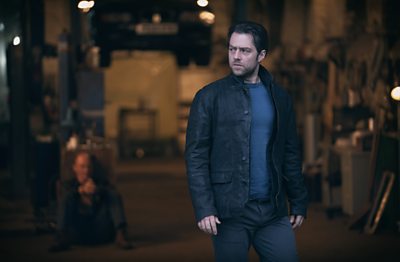
You have played a few cops before, haven’t you?
Yes, a few times now in one form or another. I thought I had sufficiently explored this archetype… and then Rebus came along.
Why did you make an exception for Rebus, then?
Rebus is an iconic character in Scottish literature and television. It already has such a huge following. That aside, it was within the first ten pages of episode one that had me absolutely hooked. I could tell Greggory Burke was doing something new and exciting with this. It felt real, it felt dark, and it felt charged.
So you instantly knew that Rebus was not going to be the same as other detective dramas?
Absolutely. You would imagine a procedural cop show. It’s not. It’s very much a character drama. I knew it was going to be different because we had Greg writing it, Niall MacCormick directing it, and an incredible Director of Photography in Julio Biccari. That combination and chemistry alone is going to guarantee something special.
What other elements grabbed you from the start?
The style and the aesthetic of how Niall wanted it shot were all brilliant. Dark; cinematic; gritty. It felt like something we were missing on our screens. Additionally, Greg and I shared a passion for it to be as authentic as possible to the place. We wanted these characters to be from a very real Edinburgh and a very real Fife.
The novels are immensely popular, aren’t they?
Ian Rankin’s books have got such an enormous fan base. Whenever the series comes up people are always very excited about the prospect of seeing one of their most beloved detectives come back to the screen. Ian Rankin has sold over thirty million copies of Rebus and it’s been translated into at least thirty six languages so it’s an absolute privilege to have been given the honour of bringing Rebus to life again.
What is particularly strong about this adaptation?
Ian Rankin said to Greg Burke, ‘Take Rebus and do what you want with it’. That’s already incredibly intriguing. Exciting even. Great source material amplified by Greg’s almost uncensored and very honest approach reboots the character in a way that is thrilling for TV.
What makes Greg’s scripts so good?
Everything in Greg’s writing has a beating heart. His connection to the character and the material gives him an incredible comprehension of the world he’s writing. His rare ability for dark humour and his observant social commentary brings so much depth and colour. Every character has a voice. A real purpose. So much so, that each actor took immense pride and ownership in their roles. I think that really shines through in the individual performances.
How did you approach your version of Rebus?
I started with the language, the accent and the dialect were important to get right. So vocal coaching was a regular thing. I also took to the source to gain an understanding of what made Rebus ‘Rebus’. There were significant things that stood out for me. His military career for one. I felt this should be incorporated more into his base psychology. Even though it might not be written in our script, he was successful in his SAS selection. He’s a military man. I started with the question, ‘how does this inform the character?’
The job really takes a toll on Rebus, doesn’t it?
Yes. It’s the law of diminishing returns for him. It’s not just the job, it’s life for Rebus. Greg explains this well, he uses the Scottish word ‘thrawn’ to describe someone who makes life as difficult as possible for themselves. A martyr to his own cause. Frequently faced with easier choices, Rebus will take the difficult path. As for the job, Rebus has the potential and aptitude to be a great detective, and in a lot of ways he is, but he gets in his own way often deliberately, often self-destructively.
What do you hope that people take away from the drama?
I hope people take out of it what we put in. The entire ensemble of cast and crew are immensely talented individuals who all brought their A-game to the series. I think that really shows. I hope audiences will develop an appetite for more, so that we can bring another series their way further down the line. I really hope that people will fall in love with Rebus in the same way that we have.
Interview with Brian Ferguson (Michael Rebus)
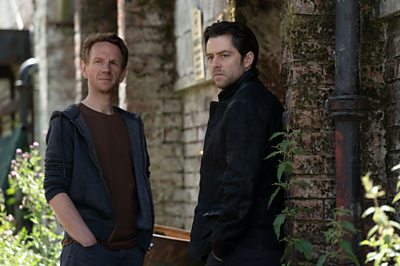
What made you so eager to be involved with Rebus?
When I read the first two scripts, it was very clear immediately how good they were. I thought they were fantastically written and a really new take on Rebus. They felt very contemporary and really honoured the books, whilst being something totally different. I knew that director Niall MacCormick was on board as director for episodes one, two and three, and I was lucky enough to work with Niall on The Victim. He’s as good as they come really, in terms of a director. So really, it was very easy to say yes!
As you said, this is a new take on Rebus. Is it the contemporary setting that that makes it so fresh?
Yes. I think it's only when you read it that you realise, “Gosh, it was 20 years ago that we last had Rebus on our screens and just how much has changed in those 20 years.” The gap is getting bigger between the very rich and the rest of us. This shows how difficult that is for the majority of people who are living with the cost-of-living crisis. So you've got these really, really pressing issues that are absolutely part of the story and of these characters’ lives. That all feels very, very contemporary.
Talk us through your character.
I play Michael Rebus, John Rebus’ older brother by about three years. This Michael is quite different from the Michael in the books. He is married and he has two teenage boys. In the last couple of years, he's come out the army after 22 years. He and his wife try and set up a business just at the time of COVID and the pandemic, and then the cost of living crisis hits and the business fails. They've put everything into it. They've remortgaged and all of that. So when we meet them, they're in a pretty desperate situation. They've moved back from Edinburgh to Fife, almost to the street that Michael grew up in. They live in a very cramped, very rundown flat. Michael is a man of real honour, a real family man. His priority really is that his family are OK. I think you get this a lot with men; their sense of honour comes from how they're able to look after their family. And when we meet Michael, he is a man who is not able to do that. The family are really, really up against it. They can't get enough work, the business has failed, and they don't have enough money to make ends meet.
How would you characterise the relationship between the brothers?
I would say that they have quite an antagonistic relationship, I think this is very familiar, particularly among working-class men. The only way that brothers know how to express their love for each other is through aggression. We sense that there's a real love there, but they have no idea how to communicate that to each other really.
How does the relationship between the brothers develop over the series?
Michael comes to need his brother more as the series goes on, mostly in a professional capacity, as he gets involved in some unfamiliar territory. John actually initiates it, but then it gets out of control. However, I think through that what we see actually is that the brothers become closer. What really bonds them is this discussion that runs through the series about the difference between the laws and the rules. The laws are set down. The police are there to enforce the law, and when you go to court, that's all about the law. But actually, I think there's something underneath the laws, particularly in these kinds of working-class communities, which is an older set of rules. That’s what brings the brothers together. It’s about an eye for an eye and a really basic set of tribal rules. The brothers become closer because actually when it comes to it they both believe in these older rules.
Did you know Richard before?
Yes. A few years ago, we did a short job together on a play, just for a few days. But my wife knew Richard quite well. So going in, I didn't know him that well, but my wife had told me a lot of good things about him. Over the course of the job, I have to say that, as I got to know him, I was just more and more impressed by him. I have a real respect and admiration for him as an actor and as a person. The way that he goes about it is brilliant. I loved watching him work. I think he's fantastic. He's always bringing something different to each take. He has a real sense of play about the work. Particularly in something like this, I think that will be really refreshing because so much of it is quite serious and quite dark. Richard has got a natural humour and enjoyment and warmth that he brings to it.
Did you have to work to develop that brotherly relationship, then?
Funnily enough, in the last project we did together, we played antagonistic brothers as well! So there's obviously something there. Clearly, it’s a dynamic that Richard and I settle into quite easily. But the heart and the warmth that Richard brings is something that certainly through the series allowed us to find the more nuanced details of their relationship. It also enabled us to discover the care that they actually have for each other. And that felt genuine between us as well. It was a real treat.
Interview with Lucie Shorthouse (Siobhan Clarke)
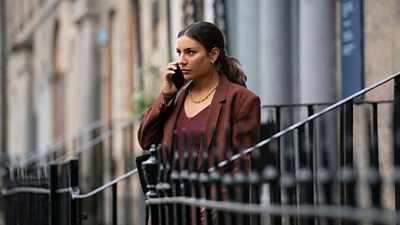
What attracted you to this production?
I love crime detective dramas. I also love the fact that everyone has heard of Sir Ian Rankin’s novels and that the Rebus novels stretch back for so long. So to be part of something like that was fantastic. Before the audition, they gave me two episodes that I could read. I was really tired and I thought, “Let me just read like a bit of one just to get a flavour and then I'll read the rest tomorrow morning.” But I couldn't put them down - to the point where I got annoyed at the end of episode two. I thought, “I need to get this job. If I don't, I won't find out what happens!”
Can you set up your character for us?
Siobhan is new to her position as Detective Constable. She has come up through the accelerated pathway scheme. For people like Rebus, who came via the more traditional route, it's seen as the easy way. So Siobhan has to prove herself, not only because she’s on the accelerated leadership pathway, but also because she’s a woman in what is still a very male-centric institution. She is a mixed-race woman, which may be a barrier as well.
How does Siobhan fare at first?
She's been put with Rebus who obviously takes no prisoners, so she's got her work cut out. But I also think she's a great match for him. She's not willing to back down from him but she's also inspired by him. If she is going to learn from anyone in this job and if she is going to accelerate, then Rebus is the right mentor to put her with. She’s really young and hungry for the job and she's very curious, too. I think she surprises herself by how much she starts to really love the job.
How would you characterise her relationship with Rebus?
They're seemingly very different in terms of attitudes, approaches, and who they are in life but they work very, very well together. She's someone who challenges Rebus in certain things as well. She is slightly intimidated by him, but not willing to compromise the integrity of her job.
How does their partnership evolve?
In episode one, Rebus and Siobhan first meet and then they go on a bit of a rollercoaster and experience some friction and fracture but they learn to really work together. It’s like one of those love-hate, eye-roll relationships. It’s like a family thing where you think, “I love you, but I don't like you. I would do anything for you, but oh my God, you're annoying!" It was fun to explore that through the episodes.
How did you find it working with Richard?
He’s just great and we’re both clowns on set. What’s really good about Richard is that he can be so silly off camera, then when the camera is switched on, straightaway, he can just absolutely get into it and be fantastic. He’s really fun to be around, really charismatic, and a great leader as well. As you're making it, a certain approach comes from the top, and I think Richard’s attitude filtered down, and that's what made the job so great. That was largely down to him setting a precedent for everybody. Richard is also really open to trying new things. I couldn't have asked for a better on-screen partner, we just got on very easily. I can't wait for people to see him in this role.
What do you love about Edinburgh?
From the days of being there at The Fringe, I know there's something really hopeful about the city. It supports creatives, just in its very essence. It's a site of exploration for any creative or actor and you feel fully supported by it. You realise how rare that is actually. It's just beautiful, I love that city.
What did you love most about doing this job?
The camaraderie. Everybody on the job was so sound, so great, so up for it, but did everything with so much humour and warmth. It was honestly such a dreamy job!
Interview with Amy Manson (Rhona Moncrieffe)
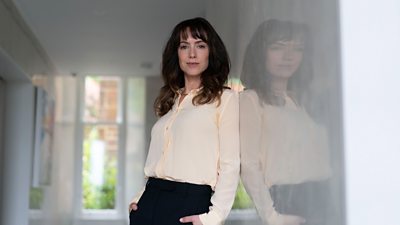
What was the attraction of this project?
I really loved the script. Gregory is an actor's writer. This script to me read almost like a high-octane thriller or a whodunit. I was really just excited to find out what happened at the end. But it's not your straightforward police procedural drama, and that's what I loved about it. It’s just brilliant TV drama.
Was Gregory available to be consulted during the shoot?
Yes. He was there for us if we needed to text him with any thoughts. He was such a great collaborator with all of us. Some storylines changed because he was able to listen to how we felt about the work. Neshla Caplan (plays Chrissie Rebus) and myself were able to talk to him about the women and what they represent within this. Gregory was there for us from the outset, which just elevated performance and relationships both on and off screen.
Gregory has written a superb character in Rhona, hasn’t he?
Absolutely. I needed to understand my character’s purpose within Rebus, and I found joy in the fact that Rhona wasn't sidelined as a woman. I also really wanted to understand why she and Rebus split up. I was just excited to explore that relationship because I also felt on reading it that it wasn't completely over.
Why do you think Rhona and Rebus broke up?
I would say, like in so many marriages, one partner put work before the love of their partner. I think that's what it boils down to. Rhona is a very empathetic and loving woman and always puts her family first. That's where she was at loggerheads with Rebus because he didn’t always put the family first. To protect herself and their daughter, she chose to step away from the relationship but that doesn't mean that she feels nothing for him. There’s still an element of her admiring who he is and what he does and what he stands for and the fact that he always seeks justice in the weird and wonderful ways that only Rebus can do.
Where do you think their relationship is now?
I think at the beginning of this series, Rhona is intent on keeping a solid family dynamic. So that means that she is just intent on getting her ex-husband and her new husband to get along for the sake of her child. Rebus irks her at times just because he is who he is. But at the same time, he's her daughter's father, and Rhona’s core value system is family. She’ll do anything to make that work.
How would you describe Rhona?
She's the glue that holds everything together. She is the honest soul within all of this. She's the one that Rebus, you would hope, would listen to above anyone else. She's empathetic and loving, but strong willed. Her core value is that she'll do anything to protect her family.
Did you enjoy filming back in Scotland?
I did. I loved it. Every time there's an opportunity to film here, I'll grasp it tightly with both hands. It always feels like coming home.
The series shows a bleak side of Edinburgh which may not be familiar to everyone, doesn’t it?
Definitely. The underbelly of Edinburgh is the backdrop of the whole show. There's a dark side of Edinburgh that we see in this that I don't think has been seen on screen before. I think viewers are going to be shocked by that and by what we've captured in all its essence. To be honest, I was shocked by it, especially when I read the scripts. The drama shows the other side of the city, and not the Edinburgh that I see as a tourist when I visit.
Why do you think that Ian Rankin’s books have captivated readers all over the world?
He captures the essence of people. I think people relate to his books because of the character of Rebus, who is as flawed as the next human. He cuts corners. He's unethical in his approach. He's always crossing lines. But his quest for justice is what's so compelling and exciting about the books. He's wanting to take down the bad guys, but sometimes he has to become the bad guy to do that. We all make some mistakes in life, and we're all held accountable for things. I think that's what's so relatable about Sir Ian Rankin's books.
How did you find it working with this cast?
It’s been amazing. Richard is incredible. I don't think I've ever seen him do something as dynamic, eloquent and hard hitting as what viewers are going to see him do with Rebus. But all the cast were a joy. They are so wonderful. We all got on so well as a cast, there was no ego. That tone is set from the top – i.e. Richard. I really do hold every single member of this cast in high esteem.
Interview with Stuart Bowman (Ger Cafferty)
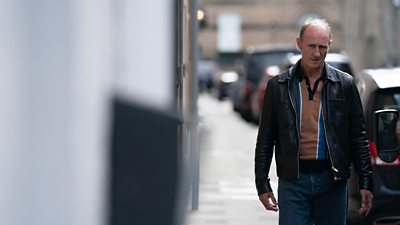
What was the appeal of working on Rebus?
I hadn’t read the books, but when I read Greg Burke’s script, it was just tremendous. I knew Greg's work, and I was delighted to be working with a television writer who was rooted in the theatre because I spent 30 years in the theatre before I began my television career. So there was something about the writing that was familiar for that reason. I think that's because of the grey areas that tend to be more easily explored in theatre than on television. Greg does that deftly. It doesn't feel like homework at all. Then I started reading the books and found the same thing: the attention to detail in the characters that Sir Ian Rankin has, as well the joy he takes in it. There also seems to be a shared sense of humour between Greg and Ian.
So the script immediately struck a chord with you?
Yes. The critic Joyce McMillan once wrote about a play I was in, and it stuck with me because it was a lovely thing to say. She said I had a connection with the text, and I absolutely did. Something in the text just resonated with me and that's what I felt when I read Greg's great script. When I started reading the books, there was also real resonance. I lived in Edinburgh for a few years, and there was something very, very familiar about the city that they were both writing about. Also, they are both Fifers and I’m a Fifer. So all three of us had a similar relationship with Edinburgh. We were not from the place. We were detached from it, but still had a love for Edinburgh. All of that was resonating in me as I was reading the TV scripts and the books. I’m now on book number eight, and I've still not stopped!
You really have become a fan, then?
Completely. I love the character and I love the world that Ian has created. It’s really unusual that even once you've started filming, you carry on doing your research with the source material. But it's not work. I'm enjoying the books enormously.
What do you particularly love about Rebus?
The world is complex. The characters are neither good nor bad. Ian and Greg are not trying to tell us that the world is ordered. They are not trying to reassure the audience that the world is a simple place. He's treating us as grown-ups. We are able to make our own decisions about the characters we're seeing. So your imagination gets to do an awful lot more work in these books and this television series.
Could you outline your character for us?
On the face of it, he’s a gangster, or a baddie, or Rebus’ nemesis. But I think above all what Cafferty is, is somebody who makes the world work the way he wants it to work. He has the force of personality and the wit and intelligence to succeed; in fact, there are very few times in his life where he hasn't been able to do that. Throughout the course of this drama, we see moments where that is stretched and that's when it becomes really interesting. That's why his relationship with Rebus is so fascinating. Rebus can push him. He's of a similar vein, and makes the world work for him, too. So they both recognise that way of being in the world. They also enjoy being in the company of this other person because they don't encounter people who are able to match them in that way very often.
Can you expand on the relationship between Cafferty and Rebus?
They have juicy encounters straightaway. Without giving anything away, from the outset we see the complexity of their relationship and their love for one another and their hatred for one another. There's a morality that they're questioning throughout everything that they do. In many ways, I think Cafferty is clearer about his morality than Rebus is and is more comfortable with the choices he's made.
